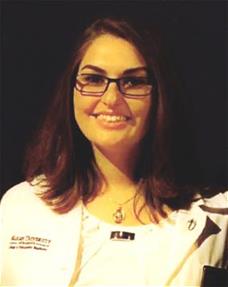by
User Not Found
| May 22, 2018
Samantha McDonald, OMS-2 | May 22, 2018
 I’m a perfectionist. I’m driven and ambitious—a bit neurotic. The prospect of failure is unacceptable and slightly terrifying. Does this sound familiar? Probably somewhat at least, considering most of us aspiring physicians share many Type A traits. I moved to Indy from the east coast to enter medical school, convinced that those traits would lead me to success. I saw challenging courses, long nights of studying, time away from family and friends, and an excess of hard work culminating in well-earned success throughout medical school. I began my first year on track, but then life had different plans.
I’m a perfectionist. I’m driven and ambitious—a bit neurotic. The prospect of failure is unacceptable and slightly terrifying. Does this sound familiar? Probably somewhat at least, considering most of us aspiring physicians share many Type A traits. I moved to Indy from the east coast to enter medical school, convinced that those traits would lead me to success. I saw challenging courses, long nights of studying, time away from family and friends, and an excess of hard work culminating in well-earned success throughout medical school. I began my first year on track, but then life had different plans.
I took advantage of every resource Marian had to offer, namely academic student support for study strategies, and even sought therapy for past personal traumas. I started out strong, studied hard, remained mindful of my well-being, and passed my introductory anatomy and scientific foundations courses. My systems courses began with CPR (cardio/pulmonary/renal) at the same time that I started breaching heavy topics in therapy, and suddenly the challenge of medical school began to feel less and less surmountable. I struggled with my study strategy, thinking a simple outline of each lecture would be enough to get me by. I struggled with focus and attention; my mind continually wandering toward personal problems while missing my loved ones back home. I lost confidence. My drive was diminishing, and my motivation was lacking.
With my minimal studying, I barely passed the first CPR exam and arrogantly thought that also meant that minimal effort could get me through the rest of my courses. I remained distracted and continued without deeply exploring the material. Then, in my only semblance of home, my cat became sick, which sent my anxiety through the roof, and I stopped studying altogether. I failed the second exam by a third of a point, barely passing the third, and failed the fourth and final exam by half a point. I was experiencing my first taste of what would become intermittent but chronic burnout throughout my first and second years. I knew I was struggling, so I reached out for help. I received excellent advice and support from both MU-COM’s student support specialist and my therapist. Unfortunately, I wasn’t ready to put that advice into action.
I continued to struggle and, even with my failures, managed to pass my first systems course. I made it to my second and final systems course of the first year and failed the first exam, again by less than a point. I was sure something was wrong with me. I just knew I was a failure, and I’d never make it through medical school—I was wrong. I asked for help. I developed a routine, made myself a schedule, never missed a therapy appointment, and completely changed my study strategy. I went from making cursory outlines based solely on lecture objectives to previewing each lecture, creating an outline, and then creating concept maps to take notes on during the lecture. My maps were colorful and involved, intimidating to some of my peers, but they were exactly what I needed. I have not failed a systems exam since.
I have, however, continued to experience burnout. Fortunately, I’ve grown immensely in my ability to introspect and ask for help over the past two years; and while I still miss my support system back home, I’ve formed some incredible relationships here in Indy. I have a fantastic friend/study group to fall back on, as well as an adopted faculty mentor who not only helps me plan my clinical rotations but can also dish out some fantastic life advice backed by hugs. I feel prepared to face and conquer burnout, and I’d like to leave you with some simple, seemingly commonsensical things I’ve picked up along the way.
- Face your demons before they find you, the stress of medical school is the equivalent of a lighted path for them.
- There are an unlimited number of resources for you: use them.
- Check-in. Check-in with yourself and your support system often.
- Take breaks. Break from studying, break from friends, break from real life if you feel you need it.
- Don’t compare yourself to others. What works for them doesn’t have to work for you. Their skills are different than yours, but you can still make an excellent physician.
